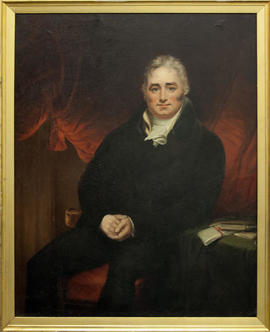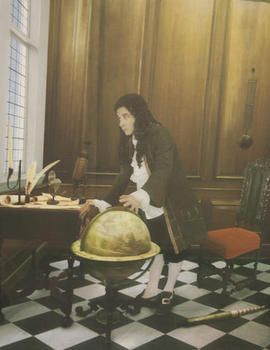- GB-2014-WSA-09143
- Person
- d. 1661
HESILRIGGE, SIR ARTHUR, BART., eldest son of Sir Thomas Hesilrigge, Bart., and Frances, dau. of Sir William Gorges, Kt, Alderton, Northants; b.; at school under Osbaldeston (Wood, Athenae Oxonienses, iii, 578); Magdalene Coll. Cambridge, fellow commoner, matr. Easter 1617; adm. Gray’s Inn 29 Jan 1622/3; succ. father as 2nd baronet 11 Jan 1629; MP Leicestershire 1640-53 [check], Leicester 1654-60; a staunch Puritan and opponent of Laud; introduced bill of attainder against Strafford; promoted the “Root and branch” bill, and proposed the Militia bill; one of the five members impeached by the King 3 Jan 1641/2; raised a troop of horse for Parliament; fought at battle of Edgehill 1642, wounded at battles of Lansdowne and Roundway Down 1643; did good service at battle of Cheriton; a leader of the Independents in House of Commons after the passing of the self-denying ordinance 1645; Governor of Newcastle upon Tyne 30 Dec 1647; recaptured Tynemouth 11 Aug 1648; refused to act as one of the King’s judges 1649; accompanied Cromwell to Scotland and supported him with reserves after battle of Dunbar; member of Council of State during Commonwealth, but opposed to Cromwell’s government after dissolution of Long Parliament; refused to pay taxes not levied by Parliament, or to become a member of the Upper House 1657; opposed succession of Richard Cromwell, and intrigued with the Army against him; at his instigation Lambert was cashiered and the Rump Parliament restored; one of the five Commissioners for the Government of the Army 11 Feb 1659/60; accused of intriguing against Monk; arrested at the Restoration, and excepted by the Bill of Indemnity for pains and penalties not extending to life; m. 1st, 24 May 1624 Frances, dau. of Thomas Elmes, Lilford, Northants; m. 2nd, 26 Jun 1634 Dorothy, dau. of Fulke Greville, Thorpe Latimer, Lincs., and sister of Robert Greville, 2nd Baron Brooke, General in Parliamentary army; d. a prisoner in the Tower of London 7 Jan 1660/1. DNB.


